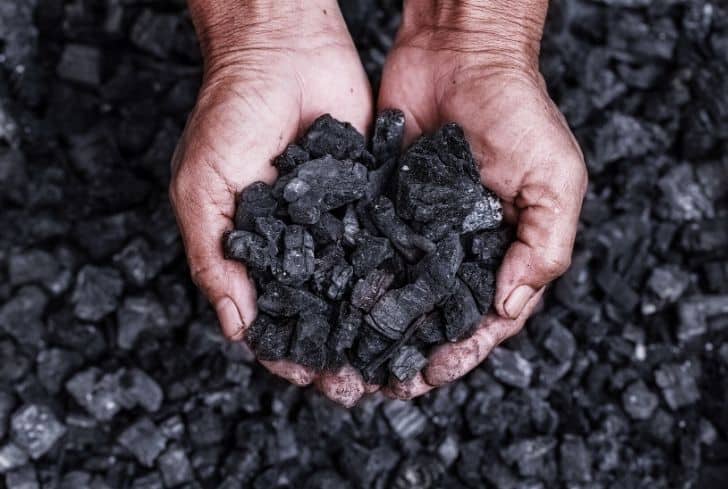Advantages and Disadvantages of Coal Energy

Coal is one of the most common sedimentary rocks found on our planet today. It is used for cooking, fuelling, and building roads as well. There is a lot more to it. But have you ever wondered how coal was discovered or who started using it in the first place?
The earliest recognition dates back to 4000BC when Neolithic inhabitants in China carved out beautiful ornaments with black lignite. In the earlier days, people referred to it as black stones. This was more common among Marco Polo and his fellow travelers, who described it as “black stones….. which burns like logs.”
Before this time, even Britishers used outcrop coal to perform funerals and create pyres. By 200AD, trade-in coal started to show up when coal was transported for drying grain.
With time, coal grew in demand for various human requirements as people started discovering its versatility in applications more closely. Today, coal continues to be a household name for a large number of purposes.
What is Coal?
At one point or the other of your life, you would have heard about or seen coal. It is a form of sedimentary rock that can generate electricity. We were taught that much in our elementary studies. It is the cheapest and most accessible fossil fuel.
Coal is a carbon-rich material that is generally black or brown. It is abundantly available all across the world. Typically, coal occurs in stratified sedimentary deposits.
Coal may also be available in different kinds. This variation may result from differences in the type of plant material, coalification degree, and even its range of impurities.
However, aside from being a primary fuel source, it has several other uses such as cement production, medicines, tars, carbon fiber, etc. As such, you would agree that it is a necessary form of raw material.
Predominantly, coal is produced in China, India, and Asia. This blog post will examine coal, its uses, and some significant advantages and disadvantages. Let’s get started.
Various Uses of Coal
Coal is undoubtedly a handy and versatile fossil fuel. Aside from its essential use, its by-products also manufacture domestic products and items. Below are some effective uses.
1. Generation of Electricity
The primary use of coal is to generate electricity. Research shows that coal is the primary source of fuel for generating electricity in the United States, and it is also responsible for 37% of electricity generation in the world.
The generation of electricity happens when coal is burnt to generate steam used to turn turbines- which are machines producing continuous power at high speed.
2. Industry Use
Many industries use coal and coal by-products to manufacture several products. The cement, pharmaceutical, paper, textiles, and glass industries are primary coal users.
Aside from these industries using coal to produce their product, they also use coal to generate and power electricity in their industries.
3. Gasification and Liquefaction
Coal can be processed into gas or liquid forms by heating coal. Manufacturing Industries can use the liquid form, also known as synthetic fuel or chemicals such as methanol, urea, and others, gotten from the gas form to manufacture several household products. Some of such products include soaps, dyes, nylons, etc.
4. Steel Production
Coal plays a significant role during the production of steel. Steel industries indirectly use coal by using coal coke, which is originally from coal.
The coal coke smelt iron ore into iron during steel production. Reliable sources state that 70% of steel produced uses coal.
5. Domestic Use
Of course, the principal use of coal would be incomplete without discussing domestic use. You have probably come across coal due to this specific use.
In some parts of the world, coal is still used as fuel for cooking. Also, it serves as a source of heat in some cold regions.
Advantages of Using Coal Energy
Coal has been a massive contributor to our lives. With its practical uses, it has managed to create a benchmark in many spaces. This source has fueled power industries, steam trains, and even steamships. But that is not all. Let us determine the range of benefits that coal has to offer to us in the modern age.
1. Coal is Cheaper than Other Fossil Fuels
One of the most common advantages of coal known by everyone is that it is cheap. But is it cheap? It is quite a debatable topic. However, compared to other fossil fuels, coal is the cheapest. It is the least expensive for its energy production.
Its affordability is majorly due to its safe extraction and transportation, which requires no special equipment for storage, unlike other fossil fuels. Aside from the cheaper power generated, it also offers a low capital investment since several power generators are already optimized to use coal, unlike other energy sources
2. Easy To Store
Thanks to some technological growths that have swiftly encouraged storage and reduction of emissions. Such technology also comes in handy to store coal properly.
Coal has significantly been known for being easy to store. It can be stored safely and adequately, and it is less likely to cause global warming like all other materials.
So, many people who fear enhancing global warming can now allow their anxiety to take a backseat. Coal also offers the added advantage of packing that helps one to store it abundantly and use it in the long run when in need.
3. Ability to Convert Into Different Forms
Coal can be used in its raw form. You can also convert it into gas and liquid forms. Aside from being used for energy, Industries can also use these forms to produce chemicals used in the manufacture of household materials, unlike the limitations that come with other sources of energy.
For instance, using solar as your primary source of energy and moving to one of the coldest places on earth. That would be quite a hassle. However, you may even package and transport your coal for use in another place with coal.
4. Minimum Waste is Produced
Coal is excellent nonrenewable energy that produces very little waste compared to other forms of energy. This is because coal by-products can be used for other products and put to another use.
Aside from the smoke from coal, there’s hardly any other waste. It’s a dynamic raw material that gives a higher value than its monetary value due to its versatility.
5. Creates Employment
Every industry needs workers to do the man work, but the coal industry needs more than just the average. Coal mining is a big business that is majorly labor-intensive. Hence, unlike other energy sources, it creates several job opportunities for drivers, miners, cleaners, loaders, managers, etc
6. Highly Compatible
Coal is known for being a highly compatible source of fuel. It provides you the leverage to collaborate with other energy sources to bring real-time advantages to you. For example- You can incorporate biomass technology into coal facilities when in need.
Such combinations can be highly useful for you as they may help decrease carbon emissions, improve long-term economic consequences and foster reliable long-term energy efficiency. If the coal depletes, you may continue to use the same facilities to help offer power to other sources to the same population when in need.
7. Minimal Room For Waste
Coal has been known to generate minimal waste. Although it does emit smoke, there will be no other waste to observe. Such a thing is a possibility today due to the efficiency in infrastructure and combustion technology. So, you can naturally use coal to produce by-products also.
By generating minimal waste, coal also leaves room for a higher value and brings peace of mind to the owner. The best part is that it is highly environment-friendly, making people less skeptical about using it in the long run.
8. A Safe Alternative
Generally, many energy sources can be hazardous to deal with. But with coal, your anxiety can take a backseat. Coal is highly safe as it makes room for restricted spates of damages.
But that is not all. With the latest technology, the safety of coal workers has also improved to a drastic extent. With the onset of safety gears and other safety essentials, people no longer feel the need to deal with coal very safely and avoid its risks.
9. A Simple Burning Process
If you have been trying to analyze how difficult it is to extract heat output from coal, you can be at ease. It is relatively easy to do. Put the coal in a reaction chamber, and the work is done. This system is high-speed, convenient, and efficient.
So, you need not have to go all out for the process. You also do not need too much expertise to tackle it the right way. So, people can handle coal easily without enough hindrance. As a result, you can enjoy a simple burning process right on time.
10. Easier To Mitigate Risks
When an emergency strikes, you can easily mitigate the risks without undergoing enough hassles. Nuclear explosions can be severe to deal with and affect the environment and the people at large.
When hydroelectric dams collapse under excessive water weight, you can expect the same thing. But if the costs of mitigating are affordable, it allows you to deal with great peace of mind. That is what coal offers to you. As it is highly affordable, dealing with risks is no longer difficult.
Disadvantages of Using Coal Energy
Although coal is highly advantageous for the environment and people, it may also have some disadvantages that make us rethink its use in need. Let us check them out.
1. It is Nonrenewable
Although coal is currently in abundance, it is a nonrenewable energy source. Nonrenewable means that we will still run out of it at some point. Of course, it won’t be very soon due to its current availability. It might be in the next 100- 200 years.
Still, if there are no viable plans to replace it as the primary source of power by then, it will affect the economy and business if we are caught off guard when it depletes.
2. Harmful to Health
People exposed to coal, including people in the nearby communities and miners who wear protective equipment, are at risk of health-related issues in coal mining.
The risk is due to the release of coal dust and emission of coal, which is released during mining. Several health-related issues such as asthma, suffocation, pneumonia might occur when you inhale the dust repeatedly.
Pneumoconiosis, otherwise known as the black lung, is one of the most common coal mining diseases. It occurs when you breathe in coal dust which settles on the lungs after a long time of exposure and often causes suffocation.
3. It Causes Noise Pollution
The machine used for mining coal is large, which unintentionally comes with loud noise and disruption. This noise might cause disturbance not only for workers but also for residents in neighboring communities.
The loud noise might also cause health problems to people around, such as lack of sleep which can lead to high blood pressure, headache, etc.
4. It is Harmful to Natural Habitat and Environment
In mining coal, the natural habitat is invariably disrupted, damaging the environment, i.e., wildlife, groundwater, landscape, etc. Coal pollution due to mining can also affect water sources for nearby communities or cause fire connected to coal mines underground.
All these, aside from being harmful to natural habitat and their residents, leading to the extinction of some species, can also be dangerous for nearby communities and might sometimes send them out of their own homes due to lack of safety.
5. It Creates a High Level of Radiation
Although, coal produces a high level of carbon dioxide which can be hazardous to health. Coal ash- a by-product of burnt coal produces radiation alongside a high level of external radiation.
These radiations are carcinogenic and might cause cancer in many people exposed to those radiations if not cautious. Using safety gear is one of the ways to remain cautious and avoid cancer and other radiation from illnesses
6. High Carbon Emissions
Coal can generate higher levels of carbon emission than other energy sources. This might be an essential drawback that makes it back out of environment-friendly energy sources in need.
Since high carbon dioxide levels can be detrimental to human health, they may cause acid rain, roof damage, and so much more.
Globally, coal has been known to be the primary agent of rising temperature levels. So, anybody who is highly exposed to the high carbon emissions due to coal is at immediate risk of suffering from paralysis, stroke, and even early death.
7. Deadly Energy Source
Did you know that people who are constantly exposed to coal are at higher risks of deadly impacts? The high levels of carbon dioxide are one primary reason that is affecting this.
In the past few years, people have recorded many coal-related deaths, including suffocation, asthma, lung cancer, low oxygen, and even premature deaths.
Pneumonia may also be an essential consequence of this. Minor results may include sleep deprivation and exhaustion. Due to such harmful effects, its advantages take a backseat in need.
8. Displaces Human Settlements
If coal is used in places where humans live, in the long run, humans may have to abandon it altogether. That is because coal renders these places inhospitable for humans in the long run by taking a toll on their health and environment.
Although the climate can be cured, its damage to people’s health and their economy can be life-risking. That is why many people have had to leave their settlements and locate themselves in different areas after coal was used in their vicinity.
Bottom Line
Coal has come in handy for several years to humankind. Undoubtedly it has been a valuable energy source and persists to be so. But we cannot avoid the disadvantages of the environment, people, and economy. That is why we must either find a reliable energy source alternative for coal or adopt new measures to make it safer for ourselves and our environment.
Mapping out such important ideas can help us save future generations from the same sufferings due to coal usage. So, why keep waiting? A balance in this energy source could change our lives for the better.






